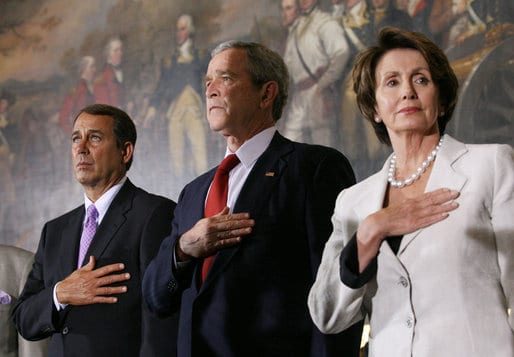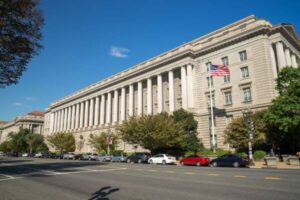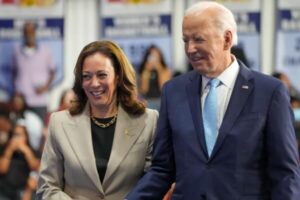Why Democrats and Republicans Are Both to Blame for National Debt
Since the Great Depression, Democrats and Republicans have defined themselves as the new version of Santa Claus. Saint Nick brings wonderful things to children for free. There’s no cost.
When there are no strings attached, no payment, children love Santa Claus all the more.
Democrats and Republicans want that love — need that love. That kind of love brings votes, and votes translate into power. The power depends on the amount of money in government. The amount of money depends on taxes.
Democrats — Angels of the Poor
The various components of the New Deal, created under Democrat President Franklin Roosevelt, gave the Democratic Party a voting bloc of the poor, which it still has to this day. The devastated underclass in America during the Depression saw its fortunes improved by the hand of government. Their fortunes never vastly improved, but they managed to survive.
Roosevelt was praised for his New Deal programs, and he was loved — like Santa Claus. The administration of Franklin Roosevelt was so loved that he was elected to a third term, an unparalleled feat that never occurred prior to FDR and has never been repeated (by law, no modern president can run for a third term).
The New Deal defined the Democratic Party, that it still defines Democrats today. In its current form, it has brought in not only the poor, but those feeling socially disenfranchised by America. Illegal immigrants, minorities, women’s issues and other social equality issues dominating the social stage have all been embraced by the Democratic Party. Most of these causes have old or newer legislation tied to them. And, many of those offer fiduciary rewards, as well. Of those that don’t, the party will work hard to fold them in with new legislation tying their number to the party with grants, loans, educational opportunities or health-related federal spending.
GOP — Grand, Opulent and Partisan
While Democrats are always anxious to share the wealth at the lower levels, the Republicans are always happy to oil the gears of business. Taxes bring in government revenue. At certain income levels, percentages of taxation increase. The Republican mantra is “success should not be punished by higher taxes.”
The general message of the Grand Old Party (GOP) is that they are the champions of free enterprise. Those who seek success and find it should be rewarded, not penalized by excessive taxation. In the modern era, the last Congress and president who were truly fiscally responsible was the Congress under President Gerald Ford and his ousted predecessor, President Richard Nixon.
Afterward, Jack Kemp, Newt Gingrich and Ronald Reagan seemed determined to look askance at balancing budgets and fiscal responsibility. Balancing taxation with spending levels became less of an important government duty.
As these elected leaders espoused through their own “Santa Claus” message, the level of taxation was punitive to the job creators, financially successful and corporate giants.
Thus began three decades of political posturing, messaging and legislation to get the “heavy hand of government” out of the way of business and out of the public’s pocket. Tax reform, corporate tax breaks, subsidies and tax cuts for the middle class became the message of the Republican Party as a whole.
While the Democrats were draining the government coffers in the name of the poor, the Republicans championed the middle-class earners, the corporations and businesses from the smallest to the greatest.
The Passion for Pork
While these dramatically opposite and speeding trains of more spending and less taxes headed toward each other on the same track, feeding the home districts continued. As reward for their love of Santa, members of the Senate and House continued with sweet pork deals for their home districts. Keeping themselves in the local broadcast and print news was essential.
Local votes put them there, so local votes had to be rewarded. Bills stuffed with home-region cash kept flowing, unabated.
The Last Straw
For several decades, there was both subtle and overt pressure from Democrats in Congress to open up homeownership to those less fortunate. During the time from the Reagan presidency though the George W. Bush administration, prime lending rates fell. As these rates fell, more and more pressure fell on lenders to help lower-income earners get into homeownership.
Through Freddie Mac and Fannie Mae, mortgage-backed securities began to be issued. These subprime, bundled mortgages infiltrated the banking and financial industry. Pushing for more access to affordable homeownership, Republican President George H.W. Bush signed the Housing and Community Act of 1992.
Because both Fannie Mae and Freddie Mac are government-sponsored institutions, Congress pushed for better rates and less stringent credit requirements to enable homeownership by a large segment of low-wage earners.
A certain percentage of loans were allotted to the less fortunate. In 1999, the Clinton administration, along with congressional support, increased that ratio, particularly for inner-city areas under distress. In 2004, stringent rules were dropped by the Department of Housing and Urban Development, making it easier for lending institutions to issue higher-risk loans for mortgages.
The storm that was brewing stretched credit beyond the breaking point.
As construction increased, riskier loans increased and the amount of debt held by paycheck-to-paycheck Americans increased. The value of homes spiraled, and lending institutions were wading in quicksand. Economists, banking executives and members of both parties knew the dangers.
Democrats kept quiet — the one that sounded a warning would be ostracized by his or her own party.
Republicans sat on their hands — who would vote for a conservative who didn’t want the underclass to have a fair shot at owning a home?
The Blame Game
On Dec. 1, 2008, it was announced that the United States had been in a recession since December 2007. Santa’s toy bag had gifts handed out by the departing Bush administration and was followed by the incoming Obama administration. At last, the bag was empty.
Democrats wanting to give out more and more, and Republicans rewarding their constituency by allowing less and less to be taken, brought two trains to a tragic halt. Each blames the other. They’re both right.
Greed, a drive for power and control, and a determination to expand a voting base brought us to this point. It has been the same for Europe. Gifts for love, generation after generation, country after country.
As we continue to roll to the financial brink, only common sense, political self-sacrifice and cooperation will stop us. The last time that happened was with a declaration in 1776.


















